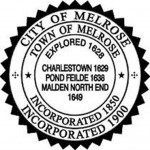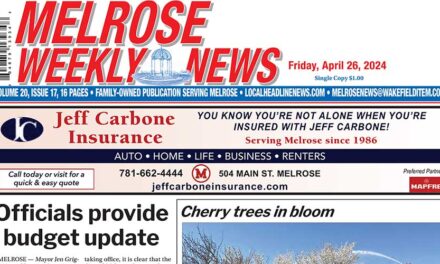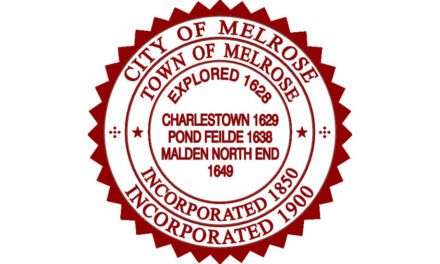Published May 29, 2020
MELROSE — The City Council continues to pore over Mayor Paul Brodeur’s first spending plan, an $88.4 million budget document that allocates about 2 percent more than what municipal government and the schools have to work with this year.
The mayor’s budget covering the year beginning July 1 proposes $5 million for the Police Department, $4.8 million for the Fire Department and nearly $33 million for schools. The various areas of the city’s public works department are also getting a total of several million dollars under the Brodeur plan.
The schools’ proposed allocation is 2 percent more than what educators are working with in fiscal year 2020. The police request request a 0.3 percent increase and fire’s proposal reflects a 0.8 percent spending hike.
A couple of weeks ago, Brodeur outlined the first budget he and his administration have crafted since his election last November.
Following are his remarks to the City Council:
Our City Charter requires me as your mayor to address you ahead of our deliberations on next year’s budget so that I may share with you the “financial condition of the city, revenue and expenditure forecasts.”
Before I do that, I must first take this moment to acknowledge the hard work, dedication, and sacrifice of all of our front line workers here in Melrose. From our firefighters and police officers, to our DPW staff and Health Department and all our city employees, the medical personnel and our grocery workers and so many others, I, as mayor on behalf of the city extend my sincere thanks and gratitude for all that you have done for our community.
Like so many other things, COVID-19 has made crafting our budge incredibly challenging. Already, the city has incurred significant COVID-19 related expenses which currently total $250,000. So far, we have received $100,000 from the state to offset this figure, and anticipate receiving a 75 percent reimbursement for the remaining costs from the Federal Emergency Management Agency program. Assuming no further relief from the Commonwealth or other source, the city currently has roughly $37,000 in costs to cover. While we will obviously keep an eye on these expenses, rest assured that the city will continue to do everything in our power to keep you all safe. These financial expenses do not begin to cover the human toll of this crisis. The myriad future scenarios, the evolving nature of the pandemic, and the variety of approaches available to combat it have introduced significant uncertainty into not only our traditional budgeting models, but into each and every one of our homes.
One thing I am certain about is the demonstrable compassion, dedication, and resolve Melrose residents and city employees have demonstrated over the past several months. Departments have transitioned overnight from operating in City Hall to operating remotely, we have adapted to new and different modes of communication, employees have reinvented their roles with the city in order to adapt to what the residents need. Many members of my team have worked around the clock, bringing in the best information available from a variety of sources, using the experience of other municipalities and other states to design our procedures, and without exception, every single City of Melrose employee has gone above and beyond during this period. It remains a privilege to lead this city and the dedication and hard work of our employees is something that every Melrose resident can rely on in this uncertain time.
As I have worked on preparing next year’s budget, I began with gathering the best information available regarding the financial outlook for our country, region, and state. While significant differences persist in forecasts produced by reputable scholars and experts, they unanimously point towards an immediate and significant economic downturn. The closure of businesses and the growth in unemployment has had staggering effects on workers and merchants across the country and here at home. Even if our recovery is historically rapid, the financial impact of this crisis promises to affect not only next year’s budget but the year after that as well. The budget I am presenting to you will is mindful of the long-term challenges we face.
Let’s take a look at how COVID-19 might affect our city’s finances. The City of Melrose’s annual operating budget is funded through three primary sources: local property taxes, state aid, and other local receipts such as excise taxes on vehicles or meals taxes. Last fiscal year, local property taxes accounted for 73.1 percent of our revenue, 16.7 percent came from the state, 7.3 percent from local receipts, and 2.9 percent came from other funding sources.
Let’s take property taxes first. Melrose’s tax base is 95 percent residential. By and large, the relative position of strength we are in today should be attributed to the willingness of the voters to pass last year’s override. While the increased revenue produced by the override has resulted in needed investments in our school system including a renegotiated teacher contract and the creation of 28.5 new positions throughout the district, little of this funding is available for use on the city side for non-school related programs and departments.
That said, the override has allowed the city to avoid the need to use one-time funds such as free cash to fund ongoing operating expenses. Any financially sound household would not count on an unexpectedly high tax return or an unanticipated holiday bonus to pay an ongoing, regular, anticipated expense like a mortgage. I am proud to say that the budget I am submitting funds recurring expenses only by using recurring revenue.
As this pandemic continues to impact the US economy, households may experience a decline in earnings, unemployment, investment losses, and other expenses or hardships. Economists advising the Massachusetts House and Senate budget authors have pointed to unemployment numbers statewide which could far exceed the 2009 recession, and even rival figures from the Great Depression.
Secondly, our budget on both the school and city side receives considerable funding from the Commonwealth of Massachusetts. Predominantly this funding comes in two forms: educational funding known as Chapter 70 and local aid known as Unrestricted Government Aid. While serving as your State Representative, I was proud to work with my colleagues to pass historic education funding reform known as the Student Opportunity Act. Moved through the Senate by our own Senator Jason Lewis, this new funding formula promised significant increases in funding for many school districts including Melrose. Early projections pegged an increase of over one million dollars in our Chapter 70 funding, and the initial budget contemplated by the School Committee relied on this increase.
In my conversations with analysts, legislators, and others, I have become increasingly concerned that the Commonwealth will not be able to fund the student opportunity act in its current form, and along with my colleagues on the school committee have concluded that our safest assumption is that we would receive chapter 70 funding equivalent to last year’s appropriation. This represents a 12.3 percent decline in what we were initially counting on.
This is one of the most challenging decisions I’ve faced in authoring this budget. So many of you have worked so diligently for years to ensure that we would be able to make needed investments in our schools in order to provide the best education possible to all of our children, and this year promised, like the last one, to represent a tremendous opportunity to make additional investments in our students. But this is simply not the position we and so many other cities and towns are in as a result of the pandemic.
That said, while we reduced the original proposal in light of the new fiscal reality, our school budget is remarkable in that it still adds 4.3 positions to address growing enrollment, increases our capacity in the area the area of social and emotional development, and fully funds our contractual obligations to our educators. We will, however, continue to make important progress that will benefit our kids.
Melrose has a strong and proud history of supporting public education. Many graduates of Melrose High School, including myself, return as adults to raise our children here and send them to our excellent schools.
Let me say a few words about our educators and our students. In the midst of a pandemic, our teachers quickly shifted their educational expertise to a fully remote environment in a matter of days. In the intervening weeks, they have further refined and expanded their own skills to offer content and connection to our kids. They have done so with the guidance and support of our Superintendent, who is ending her remarkable career in a way even she could never have imagined, and our leadership team, who have not only offered resources and support, but also Chrome Books, free lunches and breakfasts, supplies, learning kits and on and on. The District has quickly pivoted and is offering a robust series of free, online professional development opportunities this spring and summer. They have done this without fanfare and behind-the-scenes. Likewise, our students have persevered. It’s so easy to see the heartbreak. But let’s also see the way they have bravely pushed on. From our littlest pre-K students to those who are ready to graduate, we are proud of your hard work in the face of such uncertainty. And to the MHS class of 2020 . . .
Nothing we can do will ever replace or replicate the learning experience of the classroom, the connection to a trusted friend, the sound of a full orchestra room, the sun hitting your face when you run out to recess, or the high-five from your favorite teacher. But I do know this: everyone is doing their best. Students, teachers, administrators: we see you. And we thank you.
As I mentioned, the other major source of state funding is known as Unrestricted Government Aid. It is apportioned according to a formula and is given to municipalities to use as they see fit – essentially no strings attached. In reviewing state funding patterns through previous downturns and current projections of the decline in state revenue, we are anticipating a 12.5 percent decrease in our appropriation.
Making these assumptions is especially challenging as the State budget is very unlikely to be finalized prior to the end of the fiscal year. The timing of this year’s state budget promises another unknown which we must simply account for as best we can.
Third, the City of Melrose receives revenue through “local receipts” which include vehicle excise taxes, meals taxes, room occupancy taxes and others. Last year, excise taxes made up 42 percent of this particular category. So far, 79 percent of vehicle excise tax bills have been paid, despite the delayed deadline. I am concerned, however, that residents will be more cautious over the next year in making new vehicle purchases and that this may impact the revenue we receive through the excise tax.
COVID-19 has had a devastating effect on so many of our local businesses and restaurants. Even as we adjust to the new normal as we begin to reopen when it is safe, it is highly unlikely that we will be able to collect the same level of meals tax and are assuming we will see reduction in this area as well. In the category of local receipts we are anticipating a 25 percent reduction.
Lastly, as many of you know, there is an ongoing debate in congress regarding federal aid to states, cities, and towns. This is a vitally important resource for communities across the country to maintain services and protect jobs. While our congressional delegation, including Congresswoman Clark are fighting hard to secure those additional dollars, this budget does not rely on additional federal assistance related to the COVID-19 pandemic.
This is all to say that the budget I am submitting tonight relies on the full 2.5 percent tax levy increase and $300,000 in new growth even as it accounts for significant reductions in state funding. It is my fervent hope that these assumptions are found to be too dire in hindsight, but like many of you, I would rather be surprised by a positive outcome than have to make painful cuts in the event of a negative one.
Having discussed the sources of our revenue and the impacts of COVID-19 on it, I would now like to turn to how my administration priorities on the spending side. Overall, the budget I am submitting to you tonight represents the lowest percentage increase in an operating budget in a decade. As you will hear over the course of the coming days, our city departments are staffed by dedicated and capable professionals who work diligently to make Melrose the best place it can be utilizing limited resources.
Unfortunately, the fiscal picture for the city is very challenging. I cannot justify making any significant new investments in our operations for the coming year and have, for the time being, had to forestall considering positions, projects, and investments I was intending to make upon taking office.
You may be wondering why given the challenging financial times, that any particular item in this budget would increase at all. For the most part, any significant increase you’ll find in a particular item in this budget is the result of fixed costs such as insurance and other contractual obligations.
What I want each of you, and the residents of this city, to focus on is that my administration is proposing significant and unprecedented appropriations into each and every city stabilization account. The path this pandemic will take, the deliberations of our congress and president, the Commonwealth’s financial health, and the health and financial security of each Melrose family and business all remain areas of profound uncertainty.
Given the uncertain situation, I believe that the most prudent course of action is to invest in our future by strengthening our reserve accounts while still providing a high level of city services to our residents. I propose for the Council’s consideration allocating roughly half of this year’s free cash to these reserve accounts. This fiscally prudent investment will provide a hedge against the fiscal uncertainty of the next fiscal year and beyond. Where other municipalities – particularly those more reliant on state funding, must consider significant reductions in the services they are offering to residents and taxpayers, I have made it a point to adapt and adjust in order to continue to provide the important services our residents rely on. Growing these accounts will protect our ability to do just that.
Pandemic or no pandemic, municipal construction and other capital needs only increase in cost year over year. As we have discussed at length in prior meetings, key parts of our infrastructure and buildings have deteriorated. I am pleased to be able, with your support, to invest in the projects and priorities identified in our capital improvement plan including multiple pieces of fire apparatus, building improvements at Memorial Hall, school security, a generator, repairs to the fire house floor, street drainage, and more. This is an appropriate use of both our non-recurring resources and our bonding capacity and represents prudent investment to meet our needs.
While trite, it is often true that a budget is a reflection of a community’s values. I believe that to the extent that this budget is such a reflection, it demonstrates that we have struck a balance between conservative projections and modelling, maintaining quality city services, making critical one time capital investments in our infrastructure, while holding significant resources in reserve to provide a safeguard against future fiscal challenges that may arise as a result of the pandemic.
This is not the budget I anticipated writing, and I can’t imagine it’s the budget you or our residents were looking forward to receiving. It is however, a thoughtful, strategic approach which empowers us to readjust and reap the benefits of a more rapid recovery but which also protects us from the dire outcomes we may need to face. Keeping the residents of this city safe and stable in our community is my primary obligation as your mayor, and this budget allows me to do this.
Admittedly, most of what I have shared with you has been concerning and reflects the challenging situation we find ourselves in. I want each resident to know that while we as a city may be facing uncertainty and limitations because of this pandemic, there is nothing that will stop us from improving our services and community.
We will continue to make strides in protecting our environment. In fact, next week we will be launching our heat smart campaign to help residents select greener options for home heating and AC systems. We will continue to invest in the arts by moving forward with our Wayfinding and Creative Place Making project, bringing public art to our community. We will work with our business community to identify the supports and resources they need to make re-opening as successful and safe as possible. We will be innovative when it comes to transportation, and will support commonsense and cost-effective interventions to make our roads safer and public transportation easier to access.
This crisis may make us short on cash but we continue to have an abundance of creativity, intellectual capital, and dedication to a city we all call home. This crisis is an opportunity for all of us to take stock of what is important, where we are now, and where we want to be. We must not shrink from this opportunity, or simply wait for it to pass. This city will make meaningful progress. It will look different than we thought, but it will happen, and we will come out the other side stronger than ever. I invite each of you to continue to work with me to use this period as a time to improve our city so that when it is safe to gather together again we can do so in a more vibrant, thriving, welcoming city open to all.
I look forward to working with each of you and thank you for your consideration





